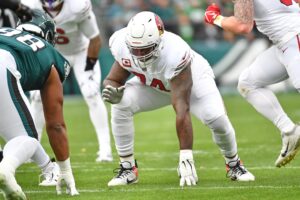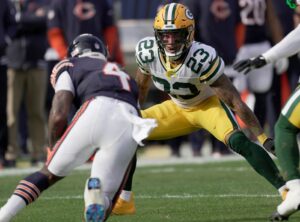In the NFL, the early months of every new year are dominated by two things: playoff football – and free agency rumors. While many of these rumors prove fruitless, often leaked by interested parties for contract leverage, some actually carry some weight. One such rumor suggests there is mutual interest in a reunion between wide receiver DeSean Jackson and the Philadelphia Eagles – but how serious are these rumors, and would such a reunion even be beneficial for both parties?
Should DeSean Jackson Return to Philadelphia?
Why Philly?
The simple answer is that Jackson started with the Eagles back in 2008 under head coach Andy Reid. He’s familiar with the organization, and aside from the Chip Kelly incident; Jackson had favorable relations with both the team and the fan base. Skeptics may point to the overwhelming sound of boos that filled Lincoln Financial Field for his first couple seasons in Washington— but in the two most recent matchups, Jackson was met with cheers. He’d be welcomed back and he knows it.
As for why Jackson would want to leave Washington, there are a few reasons. Kirk Cousins loves to spread the ball around, and Jackson has never been his top target. In 2016, Jackson attained only the fourth most receptions on the team, after Pierre Garcon – who has led Washington in receptions for the past three seasons – after Jordan Reed, and most importantly, after Jamison Crowder. The last name is key, as Crowder was listed behind Jackson on the depth chart. Now part of that is simply due to the roles these players have: Jackson was almost exclusively a deep receiver, Reed was a short-yardage threat, and both Crowder and Garcon had the more traditional do-it-all receiver roles. That’s not even counting the running backs. So on a roster full of weapons, Jackson may (rightly) feel like the odd man out, thus wanting to be on a team where he’s the guy.
Jackson would have that role on the Eagles. As far as Philadelphia receivers, Jordan Matthews is a good slot receiver, but he has yet to prove he’s a true number-one option. Zach Ertz is one of the most hot-and-cold tight ends in the NFL, and Nelson Agholor is one or two games – and that’s generous – away from being labeled a total bust at the outside position. Dorial Green-Beckham offers potential as a large target, but he’s often labeled as a developmental player. Said plainly, this was a below-average receiver corps. DeSean Jackson is a talented and versatile, veteran receiver: he’d likely, and quickly, become Carson Wentz’ new favorite target on an offense sorely in need of one.
So, why not Philly?
Philadelphia desperately needs the wideout help, but they’re hardly the only team in the NFL lacking quality receivers. The Rams, 49ers, Ravens, Buccaneers, and more could all make use of a speedy receiver like Jackson.
The Rams may be especially alluring as Sean McVay, Washington’s former offensive coordinator is now the head coach in Los Angeles. They have loads of cap space, around $40 million according to OverTheCap.com. By comparison, the Eagles only have around $8 million. If Jackson wants a big money deal, the Rams may be the more enticing choice.
Surrounding Jared Goff with quality talent makes a lot of sense after the abysmal season he had. Kenny Britt, the Ram’s leading receiver in 2016, is an adequate deep threat himself. However, he’s also an unrestricted free agent going into the 2017 season. Jackson would not only be an upgrade, but his familiarity with McVay’s system would give him an edge over the potentially-pricey Britt. Still, Jackson is a bit older than Britt and there’s no guarantee that he won’t want more money either. It’s also important to note that the Rams may be more interested in focusing on rebuilding an offensive line that was ranked 27th by ProFootballFocus.
Another aspect worth mentioning; the Eagles have considerably less projected cap space than the Rams, however, that comes before free agency cuts. Connor Barwin, Leodis McKelvin, and Ryan Mathews are all potential roster cuts as neither Barwin nor McKelvin fit the Eagles new schemes, and Mathews has simply proven too unreliable. Those cuts would collectively free up about $15 million in space. Eagles general manager, Howie Roseman, is also a solid dealmaker in the NFL, meaning that if the Eagles want Jackson enough, they’ll get him.
Jackson may very well choose to stay in Washington, or perhaps return to California where he’s from. So let’s instead focus on the tangibles of Jackson’s play. Over the past couple of seasons, he has earned a bit of a reputation as an injury-prone receiver, but is that actually true?
Can Jackson Still Play?
Aside from the 2015 season, DeSean Jackson only missed two full games in Washington over the past three seasons. Now, there have been plenty of instances where he has missed a few snaps because of a minor injury but is that any different from Dez Bryant or Steve Smith in recent years? In either case, both are still extremely productive players. Jackson may or may not be on their level in terms of performance, but he has actually played in more games than either of them: Jackson with 39, Dez Bryant with 38 and Smith with 37 (NFL, 2017).
That being said, let’s play devil’s advocate for a minute. Say that Jackson’s nagging shoulder injury becomes serious enough for him to miss a significant portion of the season. Is that really worse than dealing with a subpar receiver’s dropped passes and/or mental lapses all season? Not to mention the fact that he played in all but one game this past season with the same injury, attaining 56 receptions for 1,005 receiving yards, four touchdowns, and 17.9 yards per reception. The score number isn’t overly impressive, but Jackson has always been more of an I-can-get-you-to-the-red-zone-so-someone-else-can-punch-it-in kind of player. In 2013, his best season, he still only had 9 touchdowns which tied for 14th among receivers.
On the flipside of that, Jackson’s 17.9 YPR average is fourth best in the league, trailing only Rob Gronkowski, Sammie Coates, and Chris Hogan. According to the NFL’s Next Gen Stats, Jackson had the third fastest run all season by achieving a maximum speed of 22.6MPH – so it’s safe to say that even at age thirty, Jackson didn’t lose a step (NFL, 2017).
How about age thirty-one? That question is a little harder to answer. It’s almost impossible to predict how long a player can hold off their inevitable decline. The legendary Peyton Manning went from throwing 39 touchdowns in 2014 to only 9 in 2015 – the talent around him actually improved, but age simply caught up and his injuries piled on. Jackson played well in 2016, but what guarantee is there that he’ll be able to maintain that level of excellence?
Realistically speaking, there isn’t a guarantee; but there have been plenty of great receivers that have played well into their thirties with only minimal declines. Steve Smith Sr., Anquan Boldin, Andre Johnson and Larry Fitzgerald are only a handful of the many players that had successful seasons after their 30th birthday. There’s no reason to suggest that Jackson can’t join that list; he can still play.
But can he fit?
As mentioned, Jackson started his NFL career under Andy Reid, who just so happens to have mentored Doug Pederson, the current head coach of the Eagles. There are plenty of small differences between the two coaches, but Jackson wouldn’t be learning an entirely new offense. Even if he was, Jackson has shown plenty of versatility with success in Reid’s, Chip Kelly’s, and Sean McVay’s schemes. That’s not even counting the multitude of different quarterbacks he has played with. Bluntly put, Jackson has found ways to be successful in every system he has played in – fitting isn’t a concern.
What does he bring to the Eagles Offense?
If DeSean Jackson were to return to the quality receiver-starved Eagles, he’d be an overwhelming difference maker. Jackson would add a dimension to Philadelphia that wasn’t seen much in 2016. The Eagles rarely attempted to stretch the field as Nelson Agholor and Bryce Treggs were simply too unreliable. Jackson is far better than either of those players, giving the Eagles a legitimate deep threat option.
Jackson would also draw coverage, potentially freeing up Jordan Matthews and/or Dorial Green-Beckham. For example, if the Eagles were playing the New York Giants’ man-coverage, Jackson would most likely match up against top corner Janoris Jenkins. On the opposite side, Green-Beckham would face weak-side corner Eli Apple in a potential size mismatch, while Matthews lines up against slot corner Dominque Rodgers-Cromartie. Even if Jackson is shut down by Jenkins, the other two receivers have more favorable matchups – and that’s all assuming the Eagles don’t draft a high-profile rookie at the position. Regardless, the Eagles almost never found themselves with a favorable receiver-matchup in 2016 – Jackson could bring that element in 2017. Thus, if Jackson ends up in Philadelphia he’ll surely be a major boost to an offense that’s already supplemented by a quality defense.
Not to mention, his addition would spur the development of Carson Wentz. Just like the Rams need to supply Jared Goff with talent, the Eagles must do the same with Wentz.
Finally, Jackson would bring experience to a starting wide receiver corps that collectively has seven seasons combined from three players. Even if Jackson were to underperform, his mentorship could prove invaluable – especially for Nelson Agholor, who was meant to replace DeSean Jackson in the first place.
Overall, Jackson’s future may be up in the air at the moment, but there’s no question that his return would benefit Philadelphia – and since the wide receiver position is arguably their greatest weakness, they’ll be willing to benefit Jackson’s pocketbook too. Outside of Wentz, and maybe Darren Sproles, he’d be the biggest name on the offense. Instead of being the fourth option in Washington, he’d be the first in Philadelphia.
Main Photo:






